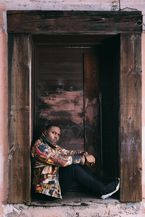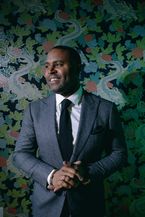Kendrick Scott Oracle - A Wall Becomes A Bridge
KENDRICK SCOTT ORACLE - A Wall Becomes A Bridge
Blue Note / Universal
Veröffentlichung 5. April 2019
Drummer and composer Kendrick Scott kicked off his Blue Note contract four years ago with We Are the Drum. Expertly produced by Derrick Hodge, Scott’s creative confidant and musical brother, and featuring a stunning guest performance by vocalist Lizz Wright, it earned rave reviews and reiterated how Oracle, Scott’s long-running working group, is one of the most thoughtfully powerful jazz bands of its generation.
When it came time to follow this success up with a new effort, however, Scott felt stuck. Nothing he wrote or played seemed good enough; self-doubt had formed a blockade where inspiration once flowed. But, as Scott points out today, “Wayne Shorter says there’s always something unfolding on the other side of the negative.” Hodge, who’d signed on again as Scott’s producer, witnessed what the drummer was putting himself through and had a similar realization. For years Hodge has been dedicated to shaping Oracle’s sonic identity, even relinquishing his role as the band’s bassist to work behind the scenes. Scott calls him “the sixth member of Oracle.”
“Derrick said, ‘We need to tap into your fears and insecurities and make some art about them,’” Scott recalls. “That was amazing to me—that he got me out of my own head.” Scott gathered up the compositions he’d been working on—both finished and unfinished—and headed into the studio, where “Derrick and the band helped me unfold them, and they became the record that you hear.”
That gorgeous new Blue Note album from Scott and Oracle is called, not incidentally, A Wall Becomes A Bridge. And the implications of that title aren’t exclusive to Scott’s artistic breakthrough. “A Wall is a provocation,” Scott says, adding that he “loves to create things for conversation. So I also wanted the idea to speak about a certain president.” Many of us would argue that 45 is all wall and no bridge, but Scott sees a silver lining in this increasingly absurd political age. “With all of these different issues coming to the forefront, we can now say, ‘Things like systemic racism still exist and we need to deal with them.’ More people are paying attention to the government, and that level of intensity is what we need—as is that level of intent in how we vote and how we live and how we treat others. All of those things are a bridge.”
An even more essential part of why this 12-track song cycle is so affecting lies in its ability to be interpreted. A musical and metaphorical journey in reverse, it arrives with a bridge and voyages back toward its beginning as a wall. Along the way, a gamut of themes is explored, including innocence (“Archangel”), acceptance (“Windows”), fear and insecurity (“Voices”) and resistance (“Pl?h”—or help spelled backwards). “I want listeners’ imaginations to run wild,” Scott explains. “I want them to think about, ‘What does this mean to me and my community? What does it mean to our country and the world at large?’”
These performances—these soundscapes—certainly provide an occasion for searching and reflecting. Oracle’s peerless lineup includes the pianist Taylor Eigsti who Scott calls “the engine of the band”—a virtuoso with a keen sense of time, and a natural, good-humored communicator on and off the bandstand. Bassist Joe Sanders, as Scott puts it, is the “embodiment of innovation,” at once a stalwart anchor who understands that less is more and a supremely gifted melodic voice who belongs in the frontline. Scott met his guitarist, Mike Moreno, at age 14, when both were students at Houston’s High School for the Performing and Visual Arts, the venerated incubator for jazz talent like Jason Moran, Robert Glasper, Chris Dave and Eric Harland. “I kind of started the band around Mike,” Scott recalls. “He’s always been an inspiration to me.” Moreno’s playing here is equal parts expressive grace and jaw-dropping mastery. But it’s a similar sense of aesthetics that might be Moreno’s most crucial contribution to Oracle; namely, Scott and Moreno share an ongoing search for the space between Brazilian geniuses like Milton Nascimento and the icons of postbop. On tenor and soprano saxophones, bass clarinet and alto flute is John Ellis, a still-underrated musician whose staggering range of abilities extends from jazz’s deepest roots—Scott met him while on tour in New Orleans—to its state-of-the-art, 21st century harmonic and rhythmic language.
Within that singular meld of talent on A Wall Becomes A Bridge is a secret weapon: the turntablist Jahi Sundance, whose credits include high-profile hip-hop production as well as tour-DJ duties for Glasper, Mos Def, Talib Kweli, and Meshell Ndegeocello. On both interlude-esque cuts (like “BeLoved,” a near-psychedelic probe into trust and vulnerability) and longer explorations like the meditative opener, “New Eyes,” Sundance immerses his own artful craft into the musicianship that surrounds him. (In many band-plus-DJ situations, Scott argues, “the band plays on top of what the DJ’s playing. Jahi was inside of Oracle.”) What’s more, Sundance was able to internalize the concepts and purpose behind Scott’s new work, as well as the genre-bending mission that has defined Oracle from the start. With brilliant oversight from Hodge as producer, the sessions became unprecedented aural experiences. “What he added really makes you contemplate what the record means,” Scott says. “The sound of it and the sonics. [Jahi is] like a bridge.”
As far back as he can recall, Scott, who was born in Houston in 1980, has imbued his music with deeper meaning. “Coming up in church,” he says, “you played music for a message; you played music for a purpose. Oracle lives in that space, no matter what we’re playing.” Like his fellow Houston drum greats Harland and Jamire Williams, Scott grew up with a mother who was an acclaimed gospel choir director. On top of that bedrock, he developed his technique through private mentorship and public jazz education, spurred on by an environment of fierce but brotherly competition. He moved to New York in 2003, and raised his profile performing and recording for Blue Note in trumpeter Terence Blanchard’s band (with future Blue Note artists Hodge, pianist Aaron Parks and guitarist Lionel Loueke).
“I was receiving so much information from Terence on bandleading and writing,” Scott recalls. “He was saying, ‘Take that opportunity and try to lead your own band.’ I credit him with giving me that kick in the butt.” He debuted as a bandleader with 2006’s The Source, released through his own World Culture Music label, and in 2009, the New York Times featured him in a piece entitled “Five Drummers Whose Time Is Now.” In the ensuing years, his reputation as one of the premier drummer-composers currently in jazz has only grown.
Throughout his time at the helm of his own group, Scott has employed the lessons he’s learned as a sideman working with jazz’s great bandleaders. Like Blanchard, Scott encourages his players to exercise their personalities and to contribute music. (A Wall Becomes A Bridge features tunes by Eigsti, Moreno, Hodge, and Parks alongside the drummer’s writing.) He has also performed regularly as part of Charles Lloyd’s band, and has adapted the tenor legend’s sense of trust and intuition to define Oracle. “The main thing I learned from Charles is that everybody needs to take ownership,” he says. “I feel like what makes Oracle Oracle is that each member has ownership of the band. They have ownership of the music and ownership of the intent.”
Radio Promotion:
Media Promotion (Promotion Süd, West & Nord)
Rosita Falke info (at)rosita-falke.de, Tel: 040 – 413 545 05
Musicforce
Anja Sziedat (Promotion Berlin/Ost) anja.musicforce (at)gmail.com, Tel: 030 – 419 59 615, Mobil: 0177 – 611 5675





